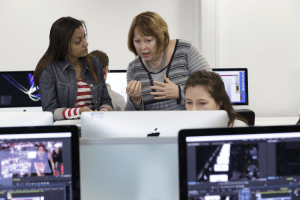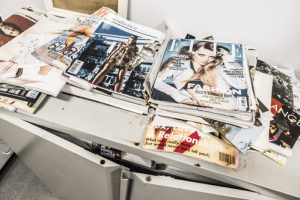Kate Morris, from our Department of Media and Communications, explains what is so special about the way journalism is taught at Goldsmiths
Hi there! Could you tell us a little bit about yourself and your background?
I run the BA Journalism programme. My background is as a news reporter and editor. My career started on the Richmond and Twickenham Times. After working on the Evening Standard, I moved to the Independent and The i, where I remained until I began teaching journalism at Goldsmiths in 2011.
 Please can you give us a quick overview of the BA in Journalism course?
Please can you give us a quick overview of the BA in Journalism course?
On the degree you will learn how to create excellent journalism. The emphasis is on the practical – you’ll find yourself out reporting in the local area from the first term. At the same time we’ll be teaching you essential computing skills: the basics of coding, how to build a website in WordPress and how to create simple plug-ins. You’ll also be taught how to use social media to find stories and promote them. You’ll learn television reporting, radio journalism, news photography and arts and culture writing. We emphasise professional skills, and all students have the chance to work on our live news website, East London Lines.
We also run a successful work placement scheme, in publications including The Evening Standard, The i, Red magazine and Time Out.
But you don’t just learn practical skills – you’ll also be taught media theory by leading academics. These lectures provide a chance for you to place journalism in a wider cultural context, and encourage you to ask important questions about the role of journalism in
a democracy and the kind of stories we should be telling.
Finally we teach media law and offer shorthand classes. You’ll be very busy!
What makes journalism at Goldsmiths distinctive?
In one word: Eastlondonlines.co.uk
This live news website, which covers a vibrant area of south and south-east London, gives students an incredible opportunity to work as reporters, editors, picture editors and social media editors in a carefully monitored newsroom. Make no mistake, this is not a closed site – once published, your work is read by people across London and the world, and gives you an instant portfolio to share with potential employers.
We send our students to Goldsmiths’ Department of Computing to learn basic coding and other key skills – something we know is in demand in the industry.
What are you looking for in an applicant? Do you have any tips for a great personal statement?
It’s simple: an interest in journalism! If you like reading a particular publication, say so. If you admire a journalist, say why.
I’m always looking for good writers, so check your statement carefully for typos and over-complicated sentences, and think carefully about what you are trying to say. If you’ve done some journalism already at school or elsewhere, I’d love to hear about it. I always read content if you link to a URL in your statement. Personal blogs show an interest in writing and a wider interest in the world. All good for budding journalists.
How does this degree support students practically for life after university?
We have worked hard to put together a programme that ensures you have the skills currently in demand in the industry – including mobile journalism and social media. Eastlondonlines.co.uk is perfect in preparing you for the rigours of the working world. We also, as already mentioned, run a work placement programme in the third year. Further, Goldsmiths has an excellent reputation, and the journalism teaching team are constantly offered job opportunities for our students, which we circulate. We put on networking events for students, invite in working journalists for panel discussions and all students are given classes preparing them for a career in the media industries.
And finally… tell us a joke!
From this year’s Edinburgh Fringe, this made me laugh. “I’ve given up asking rhetorical questions. What’s the point?” – Alexei Sayle
As well as the BA in Journalism, Goldsmiths offers a joint honours degree in History and Journalism. Find out more about both degrees at gold.ac.uk/media-communications/school-of-journalism